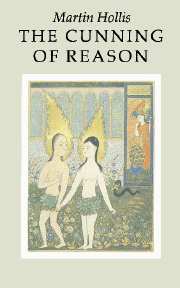Book contents
- Frontmatter
- Contents
- Preface
- 1 The sovereign artificer
- 2 Rational choice
- 3 Norms and institutions
- 4 The Cunning of Reason I: unintended consequences
- 5 Motivation
- 6 External and internal reasons
- 7 Rational Expectations
- 8 Maximising and satisficing
- 9 The Cunning of Reason II: functions and rules
- 10 Reasons and roles
- 11 Rationality and understanding
- 12 The Cunning of Reason III: self and society
- Bibliography
- Index
4 - The Cunning of Reason I: unintended consequences
Published online by Cambridge University Press: 15 December 2009
- Frontmatter
- Contents
- Preface
- 1 The sovereign artificer
- 2 Rational choice
- 3 Norms and institutions
- 4 The Cunning of Reason I: unintended consequences
- 5 Motivation
- 6 External and internal reasons
- 7 Rational Expectations
- 8 Maximising and satisficing
- 9 The Cunning of Reason II: functions and rules
- 10 Reasons and roles
- 11 Rationality and understanding
- 12 The Cunning of Reason III: self and society
- Bibliography
- Index
Summary
A traditional Persian carpet, I am told, is woven on a mesh of threads placed upright between the master weaver and his minions. The minions hook coloured wools through the mesh on command, without seeing or knowing the pattern. He orchestrates, but not by working to a blueprint. Even if the commands could be precise enough, it would not be in the spirit of the business. The weaver conjures up the design as he goes along, by giving rough guidance and turning its results into something original and unique.
This is a possible image for the Cunning of Reason, which, in Hegel's phrase, ‘makes passions work for it’. Caesar's crossing of the Rubicon brought the Roman Republic to its close and moved history into the next of a series of phases, which led finally to the nation state. Caesar, like other great world-historical individuals, was in tune with ‘the will of the World Spirit’, but only instinctively. He could not perceive the design which he served. Without him, however, the World Spirit, like the master weaver, would have had to create a different design. The Cunning of Reason is Hegel's evocative term for the larger, unseen movement of the historical process, emerging in the consequences of what historical actors choose.
I have no yearnings in this direction. The book is not a hunt for the World Spirit or an expression of belief that the consequences of the actions of world-historical individuals sum dialectically to anything fine or fitting.
- Type
- Chapter
- Information
- The Cunning of Reason , pp. 47 - 58Publisher: Cambridge University PressPrint publication year: 1988



